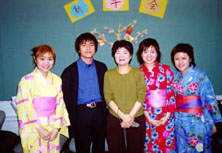Out of classroom learning: the value of study tours
The summer tours are usually organized with the assistance of the international sections of various Japanese prefectural governments. This past summer, for instance, 19 students spent around four weeks in Ishikawa, 15 in Miyazaki , and nine in Kobe . During their stay with their home families, the students studied Japanese for three hours every morning and took part in a range of cultural activities. "The feedback is always positive," Dr Takahashi said. "They establish good relationships with their host families and keep in contact with them, they learn a lot about Japanese culture, their language skills improveNand they have fun. That's why learning outside the classroom is so important."
At present, the summer tours are only available to students who are taking Japanese as a major. Nor are they compulsory, although Dr Takahashi actively encourages her students to join the tour in the summer of Year I. Without the summer tour, the knowledge they get is in the classroom and from videos, films and songs, rather than from the real world and from hearing the language spoken colloquially. "The summer tours ensure the students get the best real-life experience: they speak of foreign language, with a foreign family, on foreign soil. It really increases their confidence and motivates them to study further."
Developing students' potential
The Quality Assurance Committee's (QAC) Quality Campus Life Fund has provided financial support for the summer tours with subsidies amounting to $300,000 over the past two years. Japan Airlines also issues special student tickets at discount prices. "The QAC subsidy has been a great help in contributing towards airfares and living expenses," Dr Takahashi said. She is also impressed by CityU's culture of whole person development. "For quality teaching, teachers should keep an eye on developing students" personalities or hidden potential, rather than just classroom performance. I want to help my students know more about themselves."
Dr Takahashi's love of Japan began when she moved there to further her Japanese language skills after graduating from the Chinese University of Hong Kong . After spending 15 years in Japan , she decided to return to Hong Kong to fulfil her dream of motivating students to enjoy learning the language. "My aim is to treat students as family members in my Japanese studies family," she said. "I treat them as students but also as sons and daughters to help them do better both in the classroom and outside. It's the Japanese way to help them take their first steps, then when theyOre established, to let them go." Dr Takahashi's caring attitude towards her students and her outstanding teaching abilities have been recognized: she is one of the recipients of this year's Teaching Excellence Awards.

